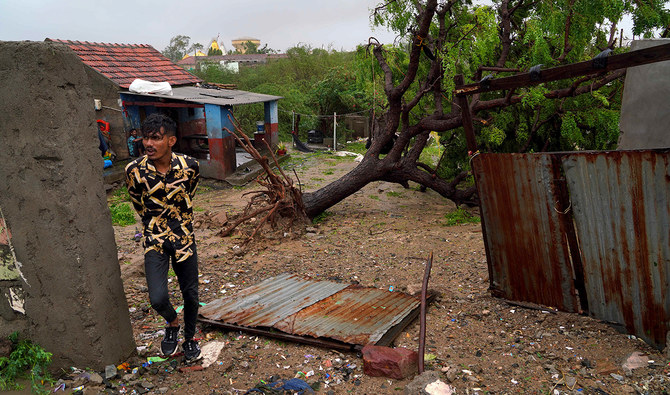MANDVI: Cyclone Biparjoy tore down power poles and uprooted trees Friday after pummelling the Indian coastline, but the storm was weaker than feared and there were only two confirmed deaths.
More than 180,000 people in the Indian state of Gujarat and Pakistan’s neighboring Sindh province fled the path of Biparjoy — which means “disaster” in Bengali — before it made landfall on Thursday evening.
The storm packed sustained winds of up to 125 kilometers (78 miles) per hour as it struck — but weakened overnight, with Indian forecasters expecting it to calm into a moderate low-pressure system by late Friday.
Two men in Bhavnagar district died on Thursday evening after drowning in flood waters, the Gujarat state government said.
Relief director C.C. Patel had earlier told AFP there had been no deaths reported in Gujarat but 23 people had been injured in the storm.
Driving rain and howling winds continued to lash the state’s coast on Friday despite the worst of the danger receding.
“I’ve never seen anything like this before,” Mukesh Pattni, 22, told AFP from the concrete shophouse where he and 10 other family members took shelter.
“I haven’t eaten anything since yesterday. Trees are falling, everything is falling apart.”
State relief commissioner Alok Pandey told reporters that nearly 500 homes had been partially damaged after Biparjoy made landfall.
More than 1,000 villages around the coast were without electricity on Friday as the force of the storm knocked down power lines.
Rescue crews were working to clear trees knocked onto roads and restore access to villages.
In Gujarat, more than 100,000 people had been moved from the storm’s path before it struck, the state government said, as well as 82,000 others in Pakistan.
Pakistan climate change minister Sherry Rehman said “no human lives were lost” on her side of the border.
“Thank God it did not directly hit the coastal areas of Pakistan,” she told broadcaster Dunya.
On Friday, shops and markets gradually reopened under drizzling skies and a cool ocean breeze in Thatta, a city around 50 kilometers inland.
“So far, so good,” said 40-year-old government worker Hashim Shaikh. “We were pushed into a state of fear for the past several days, but now it seems to be over.”
In the fishing port of Keti Bandar — forecast to be hardest hit by the storm — “there was zero damage,” according to engineer Rahimullah Qureshi from the provincial irrigation department.
Cyclones are a regular and deadly menace on the coast of the northern Indian Ocean, where tens of millions of people live.
In 2021, the coast of Gujarat was hit by the more powerful Cyclone Tauktae, which killed more than 150 people and caused large-scale destruction.
More than 4,000 people died in India when another cyclone hit the same coastline in 1998.
Scientists have warned that storms are becoming more powerful as the world gets warmer with climate change.
Roxy Mathew Koll, a climate researcher at the Indian Institute of Tropical Meteorology, said cyclones derive their energy from warm waters, and that surface temperatures in the Arabian Sea were 1.2 to 1.4 degrees Celsius (34 to 35 degrees Fahrenheit) warmer than four decades ago.























